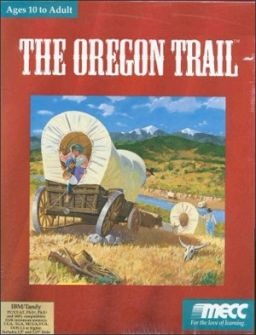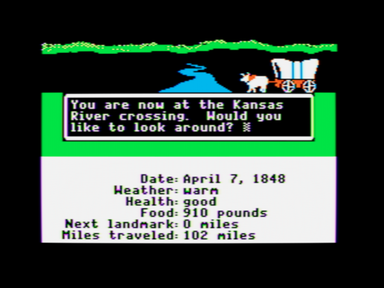Teaching With 40 Year Old Software
 I read an article that mentioned that someone teaching game design was using the old game "The Oregon Trail" as a simple example of game design. I felt a little wave of nostalgia for that computer game that I used with middle school students in the late 1970s on Apple IIe computers.
I read an article that mentioned that someone teaching game design was using the old game "The Oregon Trail" as a simple example of game design. I felt a little wave of nostalgia for that computer game that I used with middle school students in the late 1970s on Apple IIe computers.
What can we teach with 40-year-old software?
The game was developed in 1971 and produced by the Minnesota Educational Computing Consortium (MECC) in 1974. My school subscribed to MECC and received many software packages on the big 5.25 very floppy disks which we could duplicate.
The original game was designed to teach about the realities of 19th century pioneer life on the Oregon Trail. The single player is a wagon leader guiding a party of settlers from Independence, Missouri, to Oregon's Willamette Valley on the Oregon Trail via a covered wagon in 1848.
But many teachers used it in other ways. In those early day, just teaching students to use the computer and navigate a game was a learning experience. I knew teacher who, like myself, used it was a way to teach cooperation by having players work in pairs or teams and justifiable arguing about choices was encouraged.
I used the game as an example when teaching literature as away to discuss the consequences of actions (draw branching diagram here).
Looking at the game again today via one of the several emulators available online (such as https://archive.org/details/msdos_Oregon_Trail_The_1990 and https://classicreload.com/oregon-trail.html), it seems about as primitive in its graphics as it did back in 1975 in my classroom. But it worked. My homeroom students enjoyed playing it just for gaming fun, and I was able to incorporate the decision-making aspects into lessons. I taught English, not social studies, and was less interested in the historical aspects of the game. I did use it briefly in an interdisciplinary manner with a social studies teacher, but having students do research into the real Oregon Trail and that period seemed to kill interest in the game itself.
 It was one of the most successful games of all time and “The Oregon Trail” was inducted into World Video Game Hall of Fame in 2016. If you played it a few times, many of its screens are probably etched into your memory. I recall entering my real family members' names into the game the first time I played, and then sadly dysentery them "die" along the trail - probably from dysentery. It had game play moments (like hunting buffalo) and simple animation, but it was mostly text and so involved a lot of reading.
It was one of the most successful games of all time and “The Oregon Trail” was inducted into World Video Game Hall of Fame in 2016. If you played it a few times, many of its screens are probably etched into your memory. I recall entering my real family members' names into the game the first time I played, and then sadly dysentery them "die" along the trail - probably from dysentery. It had game play moments (like hunting buffalo) and simple animation, but it was mostly text and so involved a lot of reading.
I would have my students work in small groups and map the game both on a real map of the trail, and then later on a decision tree style "map" of the game's options.
For me, the strength of the game in the classroom was in understanding how decisions could change the game's outcomes and their traveler's fates.
I recall that students would argue about the design. They didn't like the random things that would happen, such as a fire in the wagon destroying objects that were worth game points. But that also worked its way into my discussions with them of literature. Things happen in novels - and our lives - that seem random and out of our control, and they have consequences.

I had no luck finding online what happened to Snyder and his company. It seems to have been consumed by Scholastic, though the link I found was a dead end. I did find something on Amazon, but it doesn't seem that the series was continued or updated recently. It could easily be an online or mobile game.
Can we use old software to teach new skills? Absolutely. Though these software packages seem crude by today's standards, they are also "classic" curiosities. I haven't taught secondary school students since 2000, so my sense of what is acceptable is lost. Certainly some of these games, or similar decision-tree kinds of games are a very viable classroom tool at all grade levels K-20. Maybe someone has already updated them or created new versions. If not, there is an opportunity.
Trackbacks
Trackback specific URI for this entryThe author does not allow comments to this entry

Comments
No comments